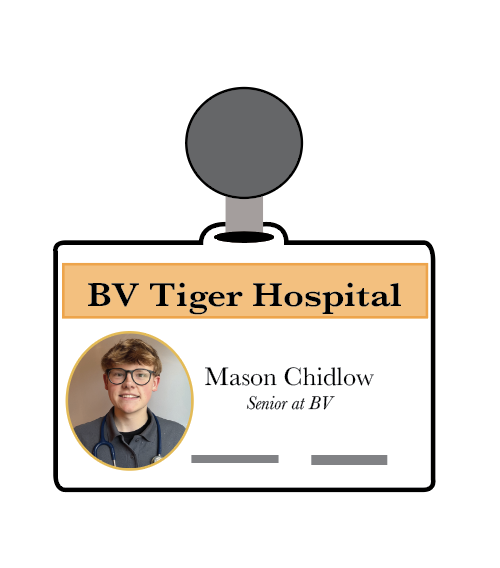Growing up, most kids cite wanting to be a firefighter or doctor as a fleeting interest with no intent to fulfill it; however, senior Mason Chidlow has taken action to follow that childhood dream by taking specialized classes at Johnson County Community College (JCCC).
“I want to go into emergency medicine as my future, and I really thought a good stepping stone to that career was getting my Emergency Medical Technician license,” Chidlow said. “I originally found out about the EMT program after researching different options in the area, and Johnson Community College had one of the best emergency medical science programs in the country.”
The choice to take the higher-level class was not one without thought — instead Chidlow had a path that he wanted to take to help give him a leg up in the future.
“I really thought this would be a great opportunity for me to earn my license to be able to work with patients, build clinical hours and especially build up experience as I’ll be applying to different medical schools,” he said.
The class offers more than just a college-level curriculum; it also provides an actual license upon completion. This license enables Chidlow to work in emergency rooms or on ambulances.
“Once you get your license to be an emergency medical technician, you’re then licensed to work in the emergency room,” he said. “The class I’m taking at JCCC requires me to take a class this semester, and then I’ll take a class over the summer. We meet in classes every Tuesday and Thursday — split between lectures and labs.”
Although the lectures offer the information for the courses, the labs were what really drew Chidlow to the opportunity. The simulations mimic real-world scenarios, allowing students to practice their skills in an authentic environment.
“The labs are designed to be as realistic as they can be to working in the field. Everything we do typically starts with a scenario. In the lab classroom there is a built-in ambulance inside, and the scene environment can be projected on all the walls. In addition, the sound of sirens and the smells will be put into the room,” he said. “On campus, there are different ambulances we can use to simulate transporting patients — it definitely makes it very similar to the actual field. In order to be eligible to take the state exam, we have to show our proficiency in a variety of skills.”
With the experience obtained in the course, Chidlow will be able to transfer his skills to the workforce before or during his pursuit of higher education.
“After I get the license, I hope to get a job on an ambulance,” he said. “I really want to work as an EMT to gain that experience in the field, working with patients, not knowing what you can expect.”
When saving lives, every step counts, and when in such a critical situation like that of emergency medicine, the stakes get raised even higher. Chidlow is not scared by this but excited for all the possibilities he can accomplish once he hones in all the means necessary to make an impact on the world. By taking proactive steps toward his goal, Chidlow is turning his childhood dream into a reality.
“I want to develop those critical thinking skills as a healthcare provider,” he said. “Those are going to be crucial to my success as an emergency medicine physician in my future career.”




